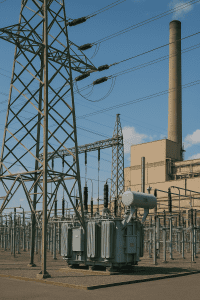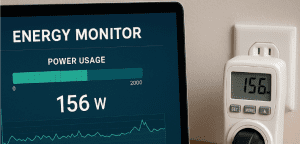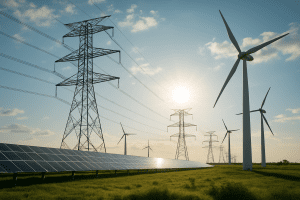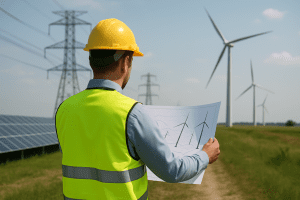The Top 5 Practical Energy Considerations for NZ Businesses Over the Next 20+ Years

Practical Energy Considerations for NZ Businesses
Energy is one of the most critical inputs for any business — and over the next two decades, how you source, manage, and pay for that energy is going to change significantly. Whether you’re running a manufacturing plant, managing a large property portfolio, or operating remote infrastructure, the energy decisions you make now will determine your flexibility and resilience down the track.
Here are the top five practical energy considerations New Zealand businesses should be thinking about now.
1. Operational Resilience Isn’t Optional
Too many businesses still rely solely on the grid and cross their fingers that outages won’t hit at the wrong time. But blackouts, storms, and network failures are becoming more frequent and more damaging — and when the power goes out, operations stop. That might mean lost production, disrupted supply chains, or compromised health and safety systems.
Energy resilience is now a core part of business continuity planning. That means having backup generators that are properly maintained and tested, on-site energy storage systems that kick in instantly, and systems that can isolate critical loads when needed. Whether you’re running a data centre, a manufacturing plant, or essential services like water or healthcare, you can’t afford to be down for hours — or even minutes.

NZ Power station Energy Considerations for NZ Businesses
2. Energy Price Volatility Is a Real Business Risk
In the past, energy costs were relatively stable and easy to predict. Not anymore. Global energy markets are more volatile than ever, and local infrastructure costs keep rising and there are more energy considerations for NZ businesses than ever. This puts pressure on OPEX and makes budgeting harder for energy-intensive operations.
Businesses that want more control over their energy spend need to look at long-term strategies. That might involve investing in on-site generation like solar or combined heat and power (CHP) systems, using battery storage to shift consumption away from peak hours, or even negotiating long-term supply agreements that hedge against price swings. It’s not about chasing the cheapest rate — it’s about reducing exposure and bringing predictability back into your energy costs.

Rising energy costs Energy Considerations for NZ Businesses
3. You Can’t Manage What You Don’t Measure
Energy use is often one of the most under-monitored parts of a business, and that’s a missed opportunity. With today’s technology, there’s no excuse for flying blind. Smart metering, real-time monitoring, and IoT-based systems now make it possible to see exactly where energy is going — and where it’s being wasted.
Once businesses have this data, they can act on it. That might mean identifying machinery that’s drawing power overnight when it shouldn’t be, spotting spikes that signal maintenance issues, or automatically shutting off non-essential loads during peak periods. Energy efficiency isn’t about turning off lights anymore — it’s about using technology to stay ahead of waste.

IoT monitoring – energy considerations for nz
4. Infrastructure Needs to Be Future-Ready
Many businesses are still running energy infrastructure that’s decades old. These systems were never designed for modern energy demands, smart controls, or load flexibility. As compliance standards tighten and energy systems get more complex, keeping legacy systems running becomes more of a liability.
Upgrading systems like switchboards, compressors, HVAC, or backup power isn’t just about ticking compliance boxes — it’s about ensuring you can scale, modernise, and protect your core operations. If your business is growing, changing locations, or adding automation, it’s critical that your energy systems don’t become a bottleneck.

Modern flexible energy grid
5. Energy Planning Should Be Part of Business Strategy
Energy decisions are often made reactively — when something breaks or when a contract comes up for renewal. But in the next 20 years, energy will need to be part of broader strategic planning. That includes thinking about how your needs might change as your business grows, relocates, or adopts new technologies like EV fleets or digitised production lines.
Rather than looking at energy as a procurement issue, start treating it as a long-term capital and operational risk. The right systems can save money, reduce downtime, and enable faster growth — but only if they’re planned properly and aligned with your business roadmap.

Planning – energy consideration for NZ
The Bottom Line
To sum up our 5 Energy Considerations for NZ Businesses; it isn’t just about keeping the lights on — it’s about staying competitive, reliable, and ready for what’s next. Businesses that treat energy as a strategic priority now will be better positioned to deal with everything from supply chain disruptions to cost pressures and compliance shifts in the years ahead.
At Shape Energy, we specialise in thinking about Practical Energy Considerations for NZ Businesses, and building real customised energy solutions. Whether you’re managing a critical site, upgrading ageing infrastructure, or looking for more control over your energy costs, we can help.
Let’s have a straight conversation about where your energy setup is heading — and what it’ll take to get ahead of it.

